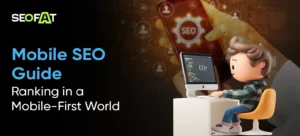Honestly, nobody looks through old directories for a doctor anymore. People pull out their phones, type “dentist near me” or “urgent care open now,” and just scroll through the first handful of results. A couple of minutes later, they’ve read a few reviews, maybe glanced at some photos, and booked an appointment. That’s it.
If your clinic isn’t showing up there, that patient is already gone — probably to someone else nearby. That’s where local healthcare SEO actually matters. It’s not about fancy tech or ranking charts. It’s about making sure people can find your clinic when they need it.
Getting found by the right people at the right time is exactly what local SEO is for.
Common SEO Challenges for Healthcare Businesses
Running a medical firm online isn’t the same as running a shop or a restaurant. There are rules, quirks, and obstacles that most small businesses never face. A few common ones:
1. Strict Privacy Rules
You can’t just post a patient’s story or a before-and-after photo without clear permission. HIPAA and other privacy rules exist for good reasons, but they make marketing trickier. Even when patients are happy to share, you have to be very careful. That can make it harder to show what your clinic does best, even when your results speak for themselves.
2. Outdated Websites
A lot of clinics still rely on old websites that take forever to load or don’t work properly on phones. Patients move away fast when that happens, and Google takes it as a bad sign too.
3. Mixed-up Contact Info
Sometimes the same clinic shows up online with two different phone numbers or addresses. It sounds small, but it really hurts local rankings because Google isn’t sure which detail to trust.
4. Unanswered Reviews
People notice when no one replies to feedback. A kind thank-you or a polite response to a complaint shows patients that someone is listening. Ignoring reviews does the opposite.
These problems aren’t impossible to fix, but they take a mix of patience and the right kind of help. Once they’re handled, your clinic can show up higher in searches, look more professional online, and earn genuine trust from local patients.
Benefits of Local SEO for Medical Professionals
Local SEO isn’t just something to tick off a to-do list. It’s what actually helps patients find you. When done right, it can make a real difference for your clinic—more calls, more bookings, more people walking through your doors.
When someone searches for a doctor, a dentist, or a specialist nearby, they’re usually ready to act. If your clinic pops up at the top, they call. They book online. They show up. Even a small improvement in visibility can bring in new patients steadily.
People check reviews, compare options, and read experiences. Seeing your clinic at the top of the results and with good feedback makes you look reliable. Patients trust what they see online. You don’t even have to meet them yet.
-
Making Marketing Dollars Count
Flyers, billboards, newspaper ads—they reach everyone, whether they need you or not. Local SEO reaches patients who are actually looking for your services. That’s money spent more wisely, and it usually gives better results.
Optimized listings, helpful blog posts, even a few good reviews—these things make your clinic approachable. People start recognizing your clinic online, feeling familiar with it, even before they call or book an appointment.
Various Local Healthcare SEO Services

Local SEO isn’t just a checklist. It’s about making your clinic easy to find, easy to trust, and easy to contact. It touches everything from your online info to the content you share.
-
Google Business Profile: Your First Impression
Your Google Business Profile is like the front door to your clinic online. If your hours are wrong, the phone number is off, or there aren’t any photos, people notice. Even small fixes, like responding to reviews, make a huge difference. It’s often the first thing patients see, so it matters a lot.
-
Keywords That Actually Work
Just using a general term like “pediatrician” won’t cut it. You need to think local—something like “pediatrician in Dallas” or “family doctor near Downtown Austin.” Targeting these local keywords puts you in front of people who are actually searching nearby, with less competition and better results.
People check reviews first. If someone sees that other patients had a good experience, they’ll trust your clinic more. Ask happy patients to leave a note. Respond to complaints politely. Even small replies make a difference. Shows you actually care.
Most people are on their phones when looking for a doctor. Slow site? Confusing layout? They bounce. Fast loading, easy to read, click-to-call buttons—make life easy for patients. Google likes it too.
Your clinic’s name, address, phone number—same everywhere, including Google and Yelp. Tiny differences confuse everyone. Keep it consistent. Makes it easy to find you.
-
Local Content That Connects
Writing about things that matter locally makes your clinic relatable. A dentist could post “Common Dental Problems in [City]” or a cardiologist could post “Heart Health Tips for [Region].” It shows you understand the area and makes patients feel like you get them.
-
Speed and Technical Stuff
Slow websites are annoying. Unsecured ones are worse. A fast, secure website keeps patients happy and gives the right impression. In healthcare, trust counts, and your website is part of that first impression.
Conclusion: Strengthen Your Local Presence with SEOFAT
Local SEO for healthcare isn’t just some online trick. It’s what actually connects your clinic to patients nearby. It helps people find you, builds trust, and keeps your clinic busy.
But it’s not as simple as just tweaking a few keywords. You need someone who knows healthcare, understands how patients search for doctors, and keeps up with Google’s constantly changing rules. That’s where SEOFAT comes in.
We’ve worked with clinics, doctors, and medical brands before, so we know what works. From making your listings easier to find, to handling reviews and your online reputation, SEOFAT focuses on things that actually bring results—more calls, more appointments, and more people recognizing your clinic in your community.












